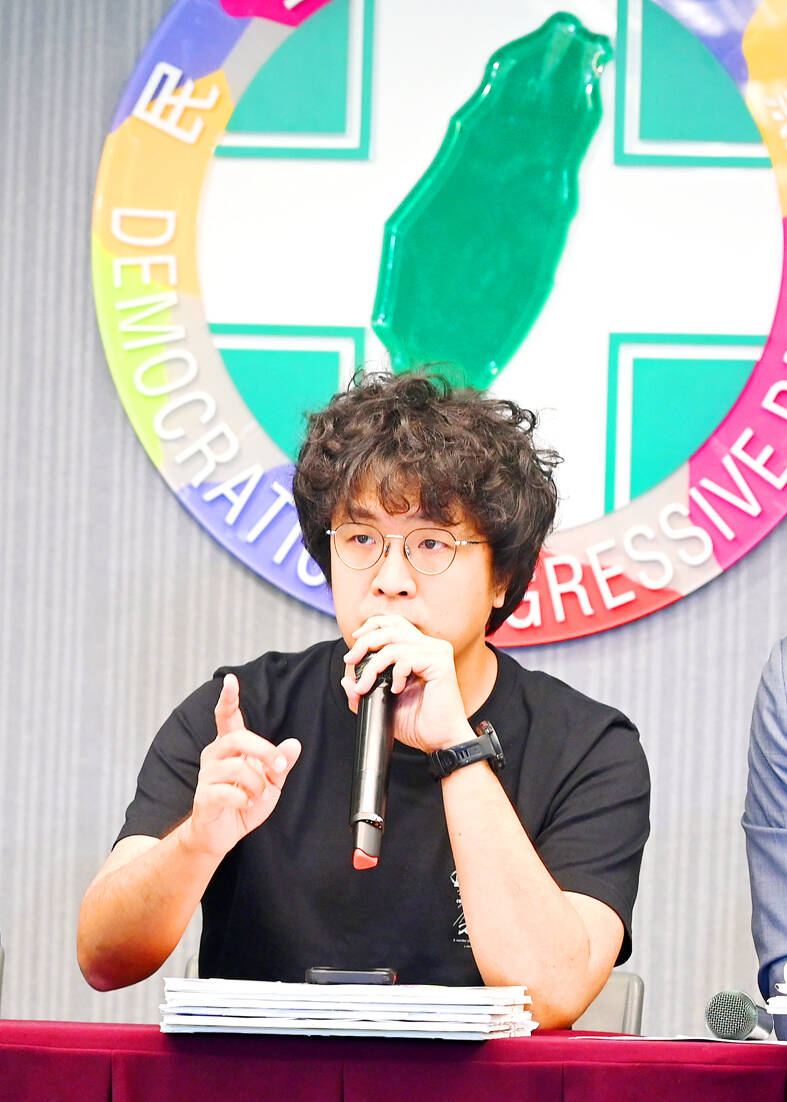Opposition lawmakers yesterday stalled a review of proposed amendments that would place greater scrutiny on elected representatives traveling to China, drawing a rebuke from Democratic Progressive Party (DPP) lawmakers.
Procedure Committee members from the Chinese Nationalist Party (KMT) and the Taiwan People’s Party voted against it, preventing the Internal Administration Committee from reviewing the bill, which was cosponsored by DPP Legislator Puma Shen (沈伯洋) and 17 others.
The proposed amendments to articles 9 and 91 of the Act Governing Relations Between the People of the Taiwan Area and the Mainland Area (臺灣地區與大陸地區人民關係條例) would require elected representatives to obtain the approval of national security officials before visiting China.

Photo: Wang Yi-sung, Taipei Times
The proposed amendments would affect lawmakers, city councilors and county councilors.
KMT Legislator Liao Hsien-hsiang (廖先翔) said at the committee that people have a constitutionally guaranteed right to travel and that behavior, rather than geography, should be the determiner of whether there is a national security risk.
KMT Legislator Chen Yu-chen (陳玉珍) said it is presumptuous to target visits to China for enhanced regulations without applying similar restrictions to the US, Japan and South Korea.
Shen said that the committee was not the venue for such discussions, as its remit is to create an agenda for other committees to review proposed laws, not examine them.
Committee members voted along party lines 10-8 to set aside the bill.
Killing the bill at the agenda-making stage deprived lawmakers of the opportunity to examine the proposal, Shen wrote on Facebook.
The opposition’s tactics have “evolved from denying discussion at the committee level to simply terminating the committee’s proceedings,” he wrote.
The day’s events showed that the committee has turned into an affiliate of KMT Legislator Fu Kun-chi (傅?萁), DPP Legislator Fan Yun (范雲) said, accusing Fu of blocking the bill to prevent the truth about his visits to China from coming to light.
Separately, Shen proposed amendments to other laws that would authorize the government to rescind the resident alien status of Chinese spouses convicted of a crime related to national security.
The amendments would add the condition of having no convictions for crimes related to national security for Chinese spouses to be granted long-term or permanent residency due to marriage with a Taiwanese, he said.
The spouses would lose their long-term residency, permanent residency and household registration, he said.
Chinese spouses who breach Taiwan’s national security laws under duress from China’s intelligence services would be granted leniency and be allowed to live with dependents after serving their sentence, he said.
The loss of residency and deportation would be reversed should a higher court overturn the conviction, and reapplication of residency would be possible upon completing the terms of a deferred prosecution agreement, he said.

Taiwan is stepping up plans to create self-sufficient supply chains for combat drones and increase foreign orders from the US to counter China’s numerical superiority, a defense official said on Saturday. Commenting on condition of anonymity, the official said the nation’s armed forces are in agreement with US Admiral Samuel Paparo’s assessment that Taiwan’s military must be prepared to turn the nation’s waters into a “hellscape” for the Chinese People’s Liberation Army (PLA). Paparo, the commander of the US Indo-Pacific Command, reiterated the concept during a Congressional hearing in Washington on Wednesday. He first coined the term in a security conference last

Prosecutors today declined to say who was questioned regarding alleged forgery on petitions to recall Democratic Progressive Party (DPP) legislators, after Chinese-language media earlier reported that members of the Chinese Nationalist Party (KMT) Youth League were brought in for questioning. The Ministry of Justice Investigation Bureau confirmed that two people had been questioned, but did not disclose any further information about the ongoing investigation. KMT Youth League members Lee Hsiao-liang (李孝亮) and Liu Szu-yin (劉思吟) — who are leading the effort to recall DPP caucus chief executive Rosalia Wu (吳思瑤) and Legislator Wu Pei-yi (吳沛憶) — both posted on Facebook saying: “I

The Ministry of Economic Affairs has fined Taobao NT$1.2 million (US$36,912) for advertisements that exceed its approved business scope, requiring the Chinese e-commerce platform to make corrections in the first half of this year or its license may be revoked. Lawmakers have called for stricter enforcement of Chinese e-commerce platforms and measures to prevent China from laundering its goods through Taiwan in response to US President Donald Trump’s heavy tariffs on China. The Legislative Yuan’s Finance Committee met today to discuss policies to prevent China from dumping goods in Taiwan, inviting government agencies to report. Democratic Progressive Party Legislator Kuo Kuo-wen (郭國文) said

Sung Chien-liang (宋建樑), who led efforts to recall Democratic Progressive Party (DPP) Legislator Lee Kun-cheng (李坤城), was released on bail of NT$80,000 today amid outcry over his decision to wear a Nazi armband to questioning the night before. Sung arrived at the New Taipei District Prosecutors’ Office for questioning in a recall petition forgery case last night wearing a red armband bearing a swastika, carrying a copy of Adolf Hitler’s Mein Kampf and giving a Nazi salute. Sung left the building at 1:15am without the armband and covering the book with his coat. Lee said today that this is a serious